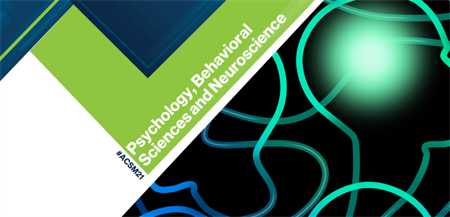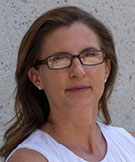Mélanie Poudevigne, Ph.D., FACSM, ACSM-EP, CMPC |
March
4, 2021

In preparation for the 2021 virtual meeting, ACSM welcomed 300+ program submissions and will offer a total of 270+ hours of scientific programming. This year, the Program Committee decided to diversify the program offering in the area of in Psychology, Behavioral Sciences and Neuroscience to include diversity issues, COVID-19 mobility restrictions, pacing, neuroplasticity, analgesia, emotions and brain health. We want to thank you for your support of this rising area in the college as we will provide a safe space to learn from one another and continue to support our community members with the most up-to-date science through this unprecedented time.
Psychology, Behavioral Sciences and Neuroscience programming begins on Tuesday, June 1
st at 1 p.m. with The American Psychological Association Exchange Lecture, “The A.I.R. We Breathe: Advocacy, Inclusion, Representation and the Importance of Attending to Cultural Diversity in the World of Sport” featuring The Association for Applied Sport Psychology (AASP) President Kensa Gunter, PsyD, CMPC. AASP is currently the leading organization for sport psychology consultants and professionals in North America. Each individual holds unique cultural identities that help to shape our perceptions of ourselves and others as well as our experiences in the world, including the world of sport. With this frame in mind, attending to cultural diversity is really an endeavor to better understand people in all of their uniqueness including athletes, coaches, performance staff and all who operate within the athletic realm. It also includes examining sport spaces and being honest about the inequities that exist while also working to create systems that are inclusive, characterized by respect & humility and embrace diversity as a strength. This one-hour session is directly followed by a second hour-long session about creating inclusive environments in exercise science education. If you would like to learn more about cultural competence and developing humility in sport and in the classroom while paying attention to creating culturally inclusive spaces, these two sessions are for you!
On Wednesday, June 2
nd, we start at 8 a.m. with the highlighted symposium, “New Findings on the Science of Pacing in Physical Activity and Sport Performance.” In recent years, there has been an explosion of research on pacing, due in large part to the implementation of novel experimental paradigms such as avatars, brain mapping technologies and data science. These and other methodologies have greatly enhanced our understanding of the perceptual inputs and neurobiological pathways involved in the decision-making processes that underlie pacing. The findings of pacing research will be presented with recent conceptualizations of fatigue theories, the placebo effect in sport and exercise and physical activity patterns existing in non-athletes. Session chair, Jack Raglin, Ph.D., FACSM, invited five outstanding researchers: David Williams, Ph.D., from Brown University School of Public Health, Florentina Hettinga, Ph.D., FACSM, from Northumbria University in the UK, doctoral students Stein Menting and Inge Stoter from the University Medical Center Groningen in the Netherlands and Dominic Micklewright, Ph.D., FACSM, Dean of Partnerships from University of Essex.
On Thursday, June 3
rd, Jochen Baumeister, Ph.D., from Paderborn University in Germany, will chair a symposium on musculoskeletal injuries resulting in neuromuscular deficits. This session will overview novel methods that incorporate enriched sensory, motor, cognitive and biofeedback stimuli to provide clinicians a means to resolve both the neuro- and muscular deficits associated with injury.
On Friday, June 4
th, Bryan Saunders, Ph.D., opens at 8 a.m. with a fascinating symposium compromised of several world-leading experts in the placebo and nocebo field from all over the globe (USA, Brazil, UK). They will discuss novel data regarding the interplay between exercise-induced analgesia and placebo analgesia; placebo, motion and emotion; and the recent application of an open-label placebo intervention to improve exercise outcomes. The session will round off with what recent research tells us about the need to reconceptualize placebo and nocebo effects in sport and exercise. Insights will be provided to demonstrate the neurobiological mechanisms and psychological determinants of placebo and nocebo effects in sport and exercise, while providing recommendations on how we can harness their power and avoid their negative consequences. This symposium will be followed at 10.30 a.m. by a captivating symposium on sitting. If 2020-2021 was the year to brace for sitting, it had to be it! ACSM Executive Board member Erica Taylor, Ph.D., FACSM, and her team of researchers will introduce how our intentions capture the motivational factors that influence a behavior. Encouraging a physically active lifestyle is different from examining an individuals’ intent to decrease sedentary behaviors. Positive effects of physical activity on health are well known, and research now supports a negative impact of sitting on health independent of physical activity participation. However, research on interventions to decrease the amount of time spent sitting is still lacking. This session will examine the factors that influence intent to decrease sedentary behaviors to enhance a healthy lifestyle, including the role of emotions. Further, a discussion about disparities in sitting time and related health outcomes across diverse populations will be presented. Non-traditional and traditional strategies proven to decrease sitting time across diverse populations and the impact of the COVID-19 pandemic on sitting will be shared with our audience.
Finally, on Saturday, June 5
th, Shelby Baez, Ph.D., begins her one hour session at 8 a.m., and she will link maladaptive psychological responses and brain function in patients after anterior cruciate ligament reconstruction. Injury-related fear is a primary barrier for return to sport and has been associated with secondary anterior cruciate ligament injury risk. Dr. Baez will explore the consequences of injury-related fear after anterior cruciate ligament reconstruction on important neural factors, including brain activity and reaction time. The importance of underlying neuroanatomy concomitant factors with injury-related fear will be discussed. Lastly, psychological interventions addressing neuroplasticity associated with injury-related fear in this population will be identified.
We look forward to welcoming you virtually until we meet again, to register for the 2021 ACSM Annual Meeting, please follow the link
here.
 Mélanie Poudevigne, Ph.D., FACSM, ACSM-EP, CMPC, started her career in Europe with the Paris V Lacretelle STAPS and graduated with her doctorate as a Graduate Research Assistant in Exercise Science at the University of Georgia where she worked with special populations in mental health and cardiac rehabilitation with young gymnasts, pregnant women and elderly dawgs fans. She also holds a Masters in Sport Management from Georgia Southern. Her scientific work focuses on exercise/mental performance for the general public and elite athletes worldwide. When she is not busy teaching, she creates service learning opportunities pairing academic educational experiences and the ACSM certifications to promote training, civic engagement, and meaningful public health research and service to underserved students at Clayton State U., in the Southern crescent of Atlanta. She contributed over 100 peer-reviewed scientific articles, book chapters on emotions, international presentations, and commercial products in health. Dr. Poudevigne was recently elected to the ACSM Board of Trustees, representing the area of Basic & Applied Science. She is a proud ACSM Fellow and certified member in exercise physiology, and she would like to encourage accomplished scientists to join her in becoming an international fellow with ACSM.
Mélanie Poudevigne, Ph.D., FACSM, ACSM-EP, CMPC, started her career in Europe with the Paris V Lacretelle STAPS and graduated with her doctorate as a Graduate Research Assistant in Exercise Science at the University of Georgia where she worked with special populations in mental health and cardiac rehabilitation with young gymnasts, pregnant women and elderly dawgs fans. She also holds a Masters in Sport Management from Georgia Southern. Her scientific work focuses on exercise/mental performance for the general public and elite athletes worldwide. When she is not busy teaching, she creates service learning opportunities pairing academic educational experiences and the ACSM certifications to promote training, civic engagement, and meaningful public health research and service to underserved students at Clayton State U., in the Southern crescent of Atlanta. She contributed over 100 peer-reviewed scientific articles, book chapters on emotions, international presentations, and commercial products in health. Dr. Poudevigne was recently elected to the ACSM Board of Trustees, representing the area of Basic & Applied Science. She is a proud ACSM Fellow and certified member in exercise physiology, and she would like to encourage accomplished scientists to join her in becoming an international fellow with ACSM.